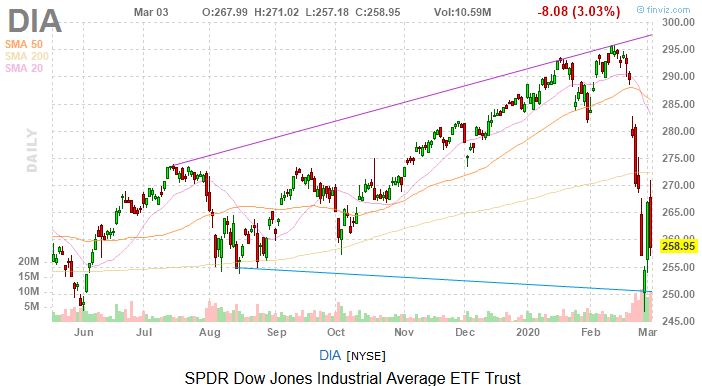The Federal Reserve revealed a 50-basis point interest rate cut earlier today, but that clearly wasn’t enough to help stocks build on Monday’s gains. In fact, those gains were all but wiped out as the three major equity indexes slid today.
- The S&P 500 gave up 2.81%
- The Dow Jones Industrial Average dropped 2.94%
- The Nasdaq Composite slipped 2.99%
- Underscoring fears that the coronavirus from China is a massive headwind to the global travel and leisure industries, American Express (NYSE:AXP) slid 5.2% to rank as the Dow’s worst-performing name today
Usually, Fed rate cuts are meaningful and today’s half a percent reduction is double the 25 basis points investors became accustomed to last year. However, investors may have been focusing more on what Fed Chairman Jerome Powell said than what he did and what he said was important.
Powell noted that the U.S. economy remains firm, but acknowledged that the coronavirus will put a damper on economic activity “for some time.”
Additionally, some market participants view the Fed announcing a rate cut that did not coincide with a Federal Open Market Committee (FOMC) meeting as a sign of panic, perhaps adding fuel to the fire of today’s declines rather than having the more desired, opposite effect.
Overall, it was a brutal day with 29 of the 30 Dow stocks lower in late trading.
Little Impact Part II
While the Fed rate cut announcement clearly had no positive effect on stocks today, one sector seemed to gloss over another pertinent reveal. Exxon Mobil (NYSE:XOM) and rival Chevron (NYSE:CVX) were among the Dow’s worst offenders despite news that the Organization of Petroleum Exporting Countries (OPEC) is moving toward another output cut.
The cartel will pare production by 600,000 barrels per day as the oil prices sag in the wake of the coronavirus. That comes after a 1.7 million barrel per day reduction late last year, but it obviously wasn’t enough to prop up wilting oil stocks like Chevron and Exxon.
Speaking of Credit Cards
As noted above, American Express was a big-time Dow loser today, but it wasn’t alone in terms of credit card equity weakness. Fellow Dow component Visa (NYSE:V) was part of that group. Not surprisingly, Visa cited the coronavirus as the culprit behind weaker card volumes and the company doesn’t expect this situation to get better over the near term.
“Cross-border growth rates have deteriorated week by week since the coronavirus outbreak in China, and trends through February 28, 2020 do not yet fully reflect the impact of the coronavirus spreading outside of Asia,” according to Visa.
Fed Woes
The Fed rate cut did have an expected impact for at least one sector, but that’s not good news. Already under pressure due to net interest income margin concerns attributable to the Fed’s 2019 rate cuts, JPMorgan Chase (NYSE:JPM) traded lower today on the rate cut news.
Goldman Sachs (NYSE:GS) wasn’t immune from that rate-sensitive downswing, joining JPM among the roughly 20 Dow members that lost at 2% today.
Maybe Some Relief
One certainly wouldn’t guess it by looking at UnitedHealth Group (NYSE:UNH) or Johnson & Johnson (NYSE:JNJ) today, but some analysts believe the healthcare sector can spring back to life following today’s Super Tuesday primaries.
Goldman Sachs analyst Asad Haider said markets have ascribed too high a level of certainty that Sen. Bernie Sanders will be the Democratic nominee. Haider believes the field is wide open and that the results from today’s primaries could confirm, potentially providing some relief to the S&P 500’s second-largest sector weight.
Bottom Line on the Dow Jones Today
One of the prevailing coronavirus-related themes is that many market observers believe this situation will be temporary. They’re right, but no one can say for sure when economic activity will bounce, whether it be next quarter or further into the year. However, the lack of clarity itself is a drag on markets.
“We see the drag on economic activity as temporary, with underlying economic fundamentals still supportive of the global economic expansion,” according to BlackRock. “The risk to this view is that the hit to economies from the outbreak and containment measures undermines fundamentals and triggers the end of this cycle.”
As of this writing, Todd Shriber did not own any of the aforementioned securities. He has been an InvestorPlace contributor since 2014.
